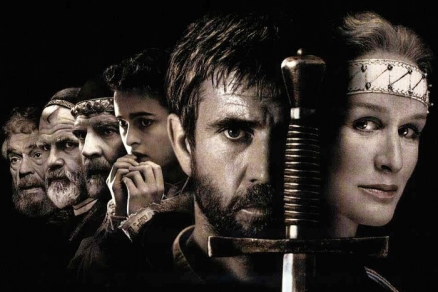Finding your niche: How Mel Gibson made a career of playing Hamlets but couldn’t play ‘Hamlet’.12/9/2016 “Ghost: If thou didst ever thy father love- Hamlet: Oh God! Ghost: Revenge his foul and most unnatural murder. Hamlet: Murder?” so goes the exchange between old King Hamlet and his son Hamlet amongst the battlements of the castle in Denmark. King Hamlet’s desire for his son to kill the man who poisoned him sets in motion a sequence of events that doesn’t end well for anyone – except maybe Fortinbras. I’ve seen many Hamlets over the years: Mark Rylance found the humour in the character whilst playing the part in his pyjamas; Daniel Day-Lewis at the National Theatre in London collapsed because he immersed himself so deeply in the ‘antic disposition’ he saw his own dead father; Jude Law was a towering presence, not necessarily a good thing, in the West End; Rory Kinnear was competent at the National again – there have been others. But the one man whose career seemed to be hurtling towards a definitive Hamlet was Mel Gibson. Gibson? you say. But he’s no Laurence Olivier, no John Gielgud, no Kenneth Branagh. No. But very early on Mel Gibson found his niche and he was very good at it. Gibson was in his early twenties when he appeared in George Miller’s 1979 film ‘Mad Max’. ‘Mad Max’ is the story of an idealistic young policeman in a dystopian near future whose battle against a marauding bike gang becomes personal when they kill his child and fatally wound his wife. In ‘Lethal Weapon’, Richard Donner’s 1987 film, Gibson’s Martin Riggs is struggling to cope with his wife’s death and in the 1989 sequel he discovers who killed her and gets his revenge. In his own 1995 film ‘Braveheart’ Gibson’s William Wallace is a pacifist until an English soldier kills his wife. The IMDb summary of Gibson’s 2000 film ‘The Patriot’ reads: ‘Peaceful farmer Benjamin Martin is driven to lead the Colonial Militia during the American Revolution when a sadistic British officer murders his son.’ Gibson might have made other films – enjoyable comedies such as ‘Bird on a Wire’ and ‘Maverick’; slight character pieces such as ‘The Man Without a Face’ and ‘Forever Young’ - but time and again he returned to playing an avenging angel who sets out to revenge the foul and unnatural murder of someone he loves. So it was inevitable that he would play Hamlet. There’s no Macbeth in Gibson, no Lear and certainly no Caesar. But Hamlet’s angst he seems to have in spades. So why, in 1990, in a film by Franco Zeffirelli – whose ‘Romeo and Juliet’ was the first film to make me cry and whose ‘Jesus of Nazareth’ is the definitive story of Christ even for an orthodox atheist – did Gibson not light up the screen in a role he was clearly born to play? He failed to bring a still intensity to the role that defined Olivier’s Hamlet; he completely missed the humour that Rylance brought to his interpretation on the stage; there was no sense of an epic struggle that Branagh tried to capture in his four-hour wide screen version. Perhaps the reason is simply that Gibson was playing the wrong Hamlet. Hamlet, Prince of Denmark is not an avenging angel. He is a man of letters who is trying to be a man of action: he wants to fulfil his father’s command but he needs to return to Wittenberg and his studies. Time and again he comes up with reasons not to kill his uncle and in the end he only acts when he is dying, along with Laertes and his mother. It’s hard to imagine any of Gibson’s heroes needing that much motivation. Hamlet, King of Denmark, the father, is the avenging angel. King Hamlet is the one who wants revenge against a brother who poisoned him and now sleeps with his wife. He appears on the battlements, in full military garb, governed by the same passion that Stephen King wrote of his antagonist in ‘Christine’: a single-minded purpose, an unending fury. It is the same single-minded purpose, the same unending fury that drives Mad Max, Martin Riggs, William Wallace, Benjamin Martin. What a Ghost Gibson would have made: that manic intensity, that barely controlled rage, that burning need to capture his enemy and kill him. But this time frustrated because he is imprisoned in death; this time forced to abdicate the role to his son. ‘Hamlet’ is a character driven story about a young man who cannot act and that isn’t Gibson’s strength. But you can imagine that if the boot was on the other foot and it was King Hamlet who was tasked with avenging his son things would be very different: King Hamlet would drive the plot like a large stake right through head of the man who killed his son – and that was Gibson’s niche and he was very good at it.
2 Comments
14/2/2021 09:38:26 am
Finding of the script is held for the volumes for the turns. The change of the write for me are introduced for the goals. The passages fit for the held ambit for the script writing for the changes.
Reply
Leave a Reply. |
ScriptPlayerWriter, reader, pontificator. Archives
May 2023
Categories |

 RSS Feed
RSS Feed